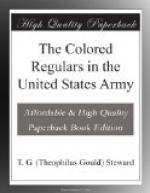Praying that your honorable commission will take due notice of these facts, and recommend such remedy as shall seem to you best,
We have the honor to be, in behalf of the New York Society for the Promotion of Education among Colored Citizens,
Most respectfully yours,
Charles B. Ray, President.
Philip A. White, Secretary.
New York City, December 28, 1857.
CHAPTER II.
American negro and the military spirit.
Early Literature of
Negro Soldiers—Negro Soldiers in the
War of the Revolution—The
War of 1812—Negro
Insurrections—Negro
Troops in the Civil War—Notes.
“Do you think I’ll make a soldier?” is the opening line of one of those delightful spirituals, originating among the slaves in the far South. I first heard it sung in the Saint James Methodist Church, corner of Spring and Coming Streets, Charleston, South Carolina, immediately after the close of the war. It was sung by a vast congregation to a gentle, swinging air, with nothing of the martial about it, and was accompanied by a swaying of the body to the time of the music. Occasionally there would be the “curtesys” peculiar to the South Carolina slave of the low country, which consists in a stooping of the body by bending the knees only, the head remaining erect, a movement which takes the place of the bow among equals. The older ladies, with heads adorned with the ever-present Madras kerchief, often tied in the most becoming and tasteful manner, and faces aglow with an enthusiasm that bespoke a life within sustained by visions of spiritual things, would often be seen to shake hands and add a word of greeting and hope which would impart a charm and meaning to the singing far above what the humble words of the song without these accessories could convey. As the rich chorus of matchless voices poured out in perfect time and tune, “Rise, shine, and give God the glory,” the thoughts of earthly freedom, of freedom from sin, and finally of freedom from the toils, cares and sorrows of earth to be baptized into the joys of heaven, all seemed to blend into the many colored but harmonious strain. The singing of the simple hearted trustful, emancipated slave! Shall we ever hear the like again on earth? Alas, that the high hopes and glowing prophecies of that auspicious hour have been so deferred that the hearts of millions have been made sick!
Of the songs that came out of slavery with these long suffering people, Colonel Higginson, who perhaps got nearer to them in sentiment than any other literary man not really, of them, says: “Almost all their songs were thoroughly religious in their tone, however quaint their expression, and were in a minor key both as to words and music. The attitude is always the same, and, as a commentary on the life of the race, is infinitely pathetic. Nothing but patience for this life—nothing but triumph in the next. Sometimes the present predominates, sometimes the future; but the combination is always implied.”




